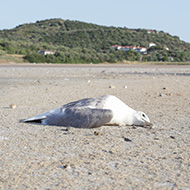
The new method will allow for easier, more accurate reports.
The Department of Agriculture, Environment and Rural Affairs (DAERA) in Northern Ireland has launched a digital service for reporting dead birds, in an effort to improve avian influenza surveillance.
While DAERA previously used a helpline for reports of dead birds, the new service allows members of the public to report them online, using desktop and mobile devices.
This will make it easier for reports to be made, as well as providing more accurate data by using GPS to directly pinpoint the location of the bird.
The service will help DAERA to monitor the spread of Highly Pathogenic Avian Influenza (HPAI) H5N1, which is being detected in wild birds across Northern Ireland, most notably in black-headed gull breeding colonies.
Dr Robert Huey, chief veterinary officer for Northern Ireland, said: “The reporting of dead wild birds by the public is a key component of the department’s avian influenza surveillance program and helps us understand if the virus is present in Northern Ireland and how it is distributed geographically.
“Previously, dead waterfowl (swans, geese, or ducks) or other wild birds, such as gulls or birds of prey, were reported to the DAERA helpline, but this new online method will make it much faster and easier for findings to be reported and will greatly enhance the wild bird surveillance program.
“The public’s continuing help is vital and I encourage anyone who comes across a dead wild bird to report it through the website on their computer or mobile device as soon as possible.”
HPAI is being identified in wild birds, but there is a likelihood it could reach kept flocks. Birdkeepers are being reminded of the legal requirement to register any birds kept outside of the house.
DAERA may collect some dead birds when H5N1 is first identified, but otherwise it is the responsibility of landowners to dispose safely of dead birds.
For more information or to report a dead bird, visit the DAERA website.



 The Animal and Plant Health Agency (APHA) has updated its online reporting service for dead wild birds.
The Animal and Plant Health Agency (APHA) has updated its online reporting service for dead wild birds.